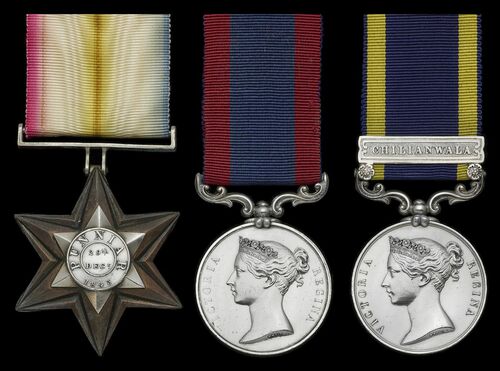
Auction: 24001 - Orders, Decorations and Medals
Lot: 61
Three: Lieutenant F. J. Alexander, 8th Bengal Light Cavalry, who shared in the fierce action at Ramnuggur only to see his regiment crumble during the Battle of Chilianwala
Punniar Star 1845 (Cornet F. J. Alexander 8th Regiment Light Cavalry); Sutlej Medal 1845-6, reverse for Ferozeshuhur (Liet F: J: Alexander 8th Regt L:C:); Punjab Medal 1849, 1 clasp, Chilianwala (Liet. F. J. Alexander, 8th Bengal Cavy), pitting and contact wear overall, very fine (3)
Frederick James Alexander was born at Fort William, India, on 21 September 1818 the son of Henry and Elizabeth Leonora Alexander, his father was a Senior Merchant with the Honourable East India Company’s Civil Service. His father’s position allowed him to apply to the Board of Directors for a commission which was duly approved and he was accepted as a Cadet with the Bengal Light Cavalry in 1836. Commissioned Cornet on 26 July 1837 he was posted to the 8th Light Cavalry at Sultanpore, Benares in 1838.
His first taste of action was in the Bundlecund Campaign 1842, where one Squadron of the 8th Bengal Light Cavalry took part in the Battle at Panwari and another three were present in action at Bhagaura. With the end of the insurrection the Regiment was posted to British forces fighting the Gwalior Campaign, being present for the taking of Punniar. Afterwards they were ordered to General Pollock’s Army of the Sutlej, where Alexander was promoted Lieutenant on 10 July 1844.
Stationed with Litter’s Division at outbreak of the First Anglo-Sikh War, near the frontier with the Sikh Empire they were forced to retreat and join the rest of the British Army advancing from Mudki. They were part of the famous withdrawal of the British Cavalry and Horse Artillery ordered by Captain Lumley who had temporarily gone mad with sunstroke. This withdrawal saved the British Army as the Sikh commander ordered a withdrawal to protect his flanks.
Still with the Regiment on the outbreak of the Second Anglo-Sikh War Alexander saw action at the famous cavalry action of Ramnuggur. They drove the Sikhs before them at first before concealed batteries opened fire and the cavalry found themselves stuck in the soft sand of the Chenab River. Unfortunately, the Light Dragoons and the 5th Bengal Light Cavalry followed up the attack and suffered enormous losses.
The Regiment performed steadfastly at Ramnuggur however at Chilianwala they were to suffer a major dent to their reputation, a trooper of the 3rd Dragoons, whose Grey Squadron were alongside the 8th, wrote an account of what happened, stating:
‘On the extreme left another Cavalry panic occurred. The 8th Native Cavalry to whom the Grey Squadron of the 3rd Dragoons were sent in support, upon seeing such a dense posse of the Sikh cavalry in the act of turning our left flank, fired off their pistols at random, and gave the Sikhs an opportunity of admiring their horses tails; an opportunity which the Sikhs would not fail to avail themselves of, and curtail some of them, if their attention had not been distracted in another direction by their old acquaintances the ‘Divor-saffeed’. Immediately the 8th Light Cavalry turned tail, Captain Unett cried out to his men, “Let it never be said, men, that the 3rd Dragoons should show the white feather. Charge!” And Charge they did, three times, as before described. This strategy of the Sikhs (trying to turn our flank) was happily frustrated, but the 8th Light Cavalry never put in an appearance again that evening. The European officers tried to rally them, and in a half-command and half-coaxing way exhorted them to “Dho tien admi lini banao” (Two or three men form line). They could not succeed, however, as well as Mr Whiting did, and as far as taking any active part in the battle, the 8th Light Cavalry were ‘non est’.’
Alexander was one of the European Officers attempting to rally the ranks, however they were unable to do so and the unit was not to take part in the rest of the Campaign. After the end of the war Alexander fell ill and was invalided to Britain between 13 January 1850-16 December 1853. Returning to India he nevertheless remained with the Invalid Establishment. He died on 9 December 1882 and is buried at Mussoorie, North West Provence; sold together with copied service papers, a former listing and army list.
Subject to 20% VAT on Buyer’s Premium. For more information please view Terms and Conditions for Buyers.
Sold for
£1,600
Starting price
£700




